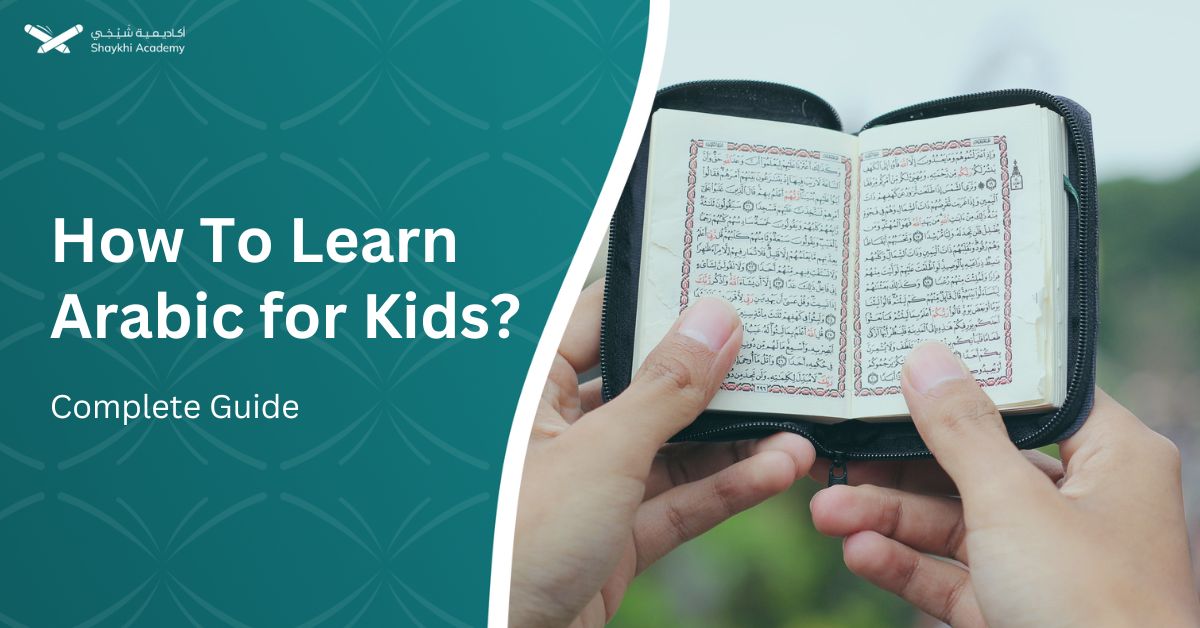How to Learn Arabic for Kids? In this blog post, we will explore fun and effective ways to teach Arabic to children. From interactive games to immersive activities, get ready to embark on an exciting journey of learning with your little ones!
Are you interested in helping your children learn Arabic? Learning the Arabic language not only opens doors to different cultures for your child but also enhances their cognitive abilities.
Arabic is an attractive and rich language that holds great historical and cultural significance. So, let us dive right in and discover how you can make the process of learning Arabic enjoyable for your children.
How to Learn Arabic for Kids
Learning Arabic can be a rewarding experience for kids as it opens doors to a rich cultural heritage and deepens their understanding of the world. However, teaching Arabic to children requires an effective approach that is engaging and fun. Here are some general tips on how to learn Arabic for kids:
1. Begin with the Basics for Kids
Begin by introducing the Arabic alphabet and pronunciation. Teach them the sounds of each letter and help them recognize the shapes. Use colorful flashcards or interactive apps to make it more engaging.
2. . Provide Vocabulary Building Activities for Kids
Teach kids everyday Arabic vocabulary such as greetings, numbers, colors, and animals. Use songs, games, and picture books to reinforce their learning.
3. Incorporate Multimedia Resources for Kids
Utilize age-appropriate online resources, educational videos, and mobile applications designed specifically for teaching Arabic to kids. These tools often offer interactive exercises, quizzes, and storytelling sessions, making the learning process fun and interactive.
4. Practice Speaking for Kids
Encourage kids to speak Arabic by incorporating it into their daily routines. Create opportunities for them to interact with native Arabic speakers, such as joining language exchange programs or finding Arabic-speaking pen pals.
5. Promote Cultural Understanding for Kids
Teach kids about Arab culture, traditions, and values alongside the language. Discuss festivals, food, clothing, and customs, helping them develop a broader understanding of the Arab world.
6. Make it Fun with Games and Activities for Kids
Engage kids in Arabic learning through fun activities such as word puzzles, scavenger hunts, role-playing games, and cultural celebrations. This will not only enhance their language skills but also keep them motivated and interested.
7. Establish a Supportive Learning Environment for Kids
Surround kids with Arabic language materials like books, posters, and labels. Set aside dedicated study time, establish language-learning routines, and reward their progress to foster a positive learning experience.
Enroll your child in Shaykhi Academy’s Noorani Qaida program to create a supportive Arabic learning environment! With dedicated study time, engaging materials, and rewarding progress, they’ll be on their way to mastering the language.
How to Learn Arabic for Kids at Home
Learning Arabic can be a fulfilling experience for children, and with the abundance of online resources, it is now more convenient than ever to learn Arabic from the comfort of your own home. Here are some tips on how kids can learn Arabic online.
1. Use Arabic language learning apps for kids
Utilize kid-friendly language-learning apps like Duolingo and Memrise, which offer interactive lessons, games, and quizzes to make learning Arabic fun and engaging.
2. Discover online Arabic courses designed for kids
Search for online courses, such as Online Arabic Classes For Kids at Shaykhi Academy, that are specifically designed for children. These courses offer step-by-step lessons, videos, and audio materials to assist kids in learning Arabic vocabulary, pronunciation, and grammar.
3. Practice with Arabic videos for kids
Encourage kids to watch Arabic cartoons, and videos, and listen to Arabic songs. This exposure to real-life conversational Arabic will improve their listening skills and cultural understanding.
4. Participate in virtual Arabic language exchange programs
Participate in virtual Arabic language exchange programs where kids can interact with native Arabic speakers through video calls or chat platforms. This will enhance their speaking and listening skills while making new friends.
5. Engage in interactive Arabic activities for kids
Engage in online Arabic language games, puzzles, and interactive activities that reinforce vocabulary and grammar concepts. Websites like Arab Academy provide a variety of interactive exercises suitable for kids.
6. Read Arabic children’s books
Look for online platforms that offer Arabic children’s books and encourage kids to read simple stories. This will enhance their reading comprehension and expand their vocabulary.
7. Practice Arabic regularly with kids
Regular practice is essential for language learning. Encourage kids to practice Arabic consistently, even for short periods daily. Consistent exposure aids fluency development and knowledge retention.
Read more about The Best Online Arabic Classes for Elementary Kids
How Can I Teach My Child Arabic?
Teaching a child a new language can be challenging, but with the proper approach and resources, it can also be an exciting experience. If you are wondering how to effectively teach your child Arabic, here are some tips that may be helpful:
1. Early Introduction for Kids
Introducing your child to the Arabic language at an early age is highly beneficial, capitalizing on their innate capacity to acquire languages during their formative years. This early exposure sets a solid foundation for language learning and facilitates their linguistic development.
2. Melodic Tunes for Kids
Enhance your child’s language immersion by integrating Arabic lullabies and traditional songs into their daily routine, harnessing the power of melodic tunes to make language learning enjoyable and interactive. This musical approach captivates children’s attention and encourages a deeper connection with the Arabic language.
3. Colorful Chart for Kids
Create a visually appealing chart with vibrant colors and simple Arabic words for beginners to enhance your child’s language learning experience. Display the chart in their room as a constant reminder and reinforcement of the language.
4. Visual Support for Kids
Utilize a variety of visual aids such as flashcards, picture books, and educational videos to supplement your child’s understanding of Arabic vocabulary and phrases, making the learning process more interactive and effective.
5. Playful Learning for Kids
Foster enjoyment and excitement about learning Arabic by incorporating language games into your child’s routine. Word puzzles, memory games, or even charades can make the learning experience both entertaining and educational.
6. Daily Interactions with Kids
Encourage daily interaction with children by incorporating Arabic into their routine through labeling objects and using Arabic words during meals and playtime. This can help children familiarize themselves with the language and make learning Arabic an enjoyable experience.
7. Encourage Conversations for Kids
Motivate your child to practice speaking Arabic by actively engaging in conversations, encouraging them to ask questions, and providing opportunities for self-expression in the language. This approach helps foster their language skills and boosts their confidence in using Arabic.
At Shaykhi Academy, we offer engaging and age-appropriate online Arabic classes for kids, providing them with the tools to develop a strong foundation in the Arabic language while fostering cultural appreciation and global understanding.
How to Speak Arabic for Kids?
Learning to speak Arabic can be a fun and enriching experience for kids. With the right resources and methods, kids can easily pick up the basics of the Arabic language. Here are some tips on how to speak Arabic for kids online:
1. Practice Arabic Vocabulary through Flashcards
Make use of digital flashcard apps or websites that provide visual aids along with audio pronunciation of words and phrases in Arabic. This helps children build vocabulary and improve their pronunciation skills through repetition.
2. Watch Animated Shows or Cartoons
There are numerous animated shows or cartoons available online that teach basic conversational phrases and vocabulary entertainingly. Children can watch these videos with subtitles initially, then gradually try to understand without them.
3. Start with Basic Conversational Phrases
Teach your child the basics of conversation by starting with simple phrases such as greetings, introductions, and common expressions. Encourage them to incorporate these phrases into their daily conversations for practical application and improved communication abilities.
4. Practice Pronunciation with Native Speakers
Find online tutors or language exchange partners who are native Arabic speakers. Regular conversations with native speakers will help kids improve their pronunciation and fluency in Arabic.
5. Engage in Conversational Activities
Consistent practice is key when it comes to speaking any new language, including Arabic. Encourage your child to have daily conversations with you or other family members using simple phrases they’ve learned so far. Practicing regularly will help them become more comfortable with spoken Arabic over time.
6. Join Online Arabic Language Communities
Many online forums and communities are dedicated to learning Arabic. Encourage kids to join these communities and participate in discussions, ask questions, and share their progress. This not only provides additional learning resources but also creates a sense of community and motivation.
Discover the art of reading Arabic with Al-Menhaj: The essential resource for beginners
Learning to read Arabic is a fundamental step in mastering the language for kids, and Al-Menhaj is the perfect book for beginners.
This comprehensive guide starts with the Arabic alphabet, teaching you the shapes and sounds of each letter. It also covers the essential symbols known as Tashkeel, which indicate the vowels and other diacritics in Arabic words.
With Al-Menhaj, you’ll be equipped with the necessary knowledge to confidently navigate Arabic texts and continue your language learning journey.
FAQs
What Is the Easy Way to Learn Arabic for Kids?
The easy way for kids to learn Arabic is through fun and interactive activities. Incorporating games, songs, and storytelling can make the learning process enjoyable and engaging.
Using visual aids such as flashcards or colorful illustrations can also help children grasp the language more easily.
Additionally, utilizing online resources specifically designed for teaching Arabic to kids can be a great tool in making the learning experience fun and effective.
What Age Should Kids Learn Arabic?
There is no specific age at which kids should start learning Arabic. However, early exposure to the language can be beneficial as young children have a greater capacity for language acquisition.
Introducing basic vocabulary and phrases from an early age helps build a strong foundation for future learning. Many experts recommend starting as early as preschool or kindergarten but ultimately it depends on each child’s readiness and interest.
Read an indepth discussion on How Long Does It Take To Learn Arabic?
Can a 13-year-old Learn Arabic?
Absolutely! Learning Arabic at 13 years old is not only possible but also advantageous due to cognitive development at this age.
The teenage brain has enhanced reasoning skills, memory retention, and increased ability to grasp complex concepts – all of which are helpful when tackling a new language like Arabic.
With proper guidance, resources tailored for their age group, and regular practice, teenagers can successfully learn how to speak, read, and write in Arabic.
Fun and Interactive Arabic Learning: Sign Up for Online Arabic Classes for Kids at Shaykhi Academy!
Shaykhi Academy offers fun and interactive online Arabic classes for kids. Our experienced teachers provide engaging lessons that make learning Arabic enjoyable for children.
With our focus on interactive activities, games, and multimedia resources, we create a dynamic learning environment that keeps children motivated and excited to learn.
Sign up now and give your child the opportunity to develop their Arabic language skills in a fun and interactive way!

Conclusion
Learning Arabic can be an exciting and enriching experience for kids. By starting with the basics, incorporating multimedia resources, and making it fun with games and activities, children can develop a strong foundation in the language.
Using language learning apps and participating in virtual language exchange programs can further enhance their skills. Regular practice and conversations are key to helping kids speak Arabic confidently.
Discovering resources like Al-Menhaj and signing up for online classes designed for kids at Shaykhi Academy can make the learning journey enjoyable. With dedication and a supportive environment, kids of all ages can successfully learn Arabic!

















































